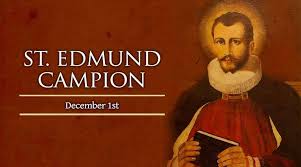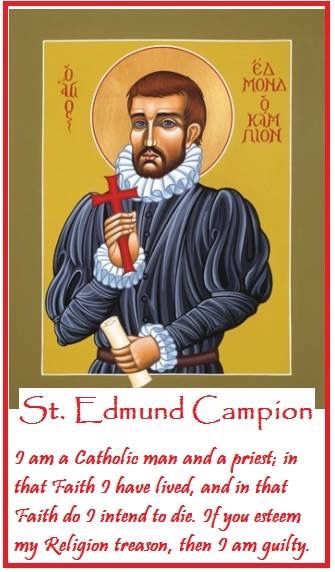Saint Edmund Campion, SJ
Born : January 25, 1540
Died : Dec 1, 1581
Beatified : Dec 9, 1886
Canonised : Oct 25, 1970
 St Edmund was born in London of Catholic parents who later turned Protestant. He received his early education in Christ-Church Hospital where as a 13-year old schoolboy he was chosen to read a Latin address welcoming Queen Mary Tudor to London. Later he studied at St John’s College, Oxford and became an important personage at the university and a lecturer with a large following among students who called themselves “Campionites”. He delivered the funeral oration at the death of his College’s founder, Sir Thomas White and also gave a memorable welcoming speech when the Queen visited Oxford in 1564 and 1566 respectively. So strong was the impression he made upon the Queen and Lords Cecil and Leicester they tried to recruit him for the Queen’s service.
St Edmund was born in London of Catholic parents who later turned Protestant. He received his early education in Christ-Church Hospital where as a 13-year old schoolboy he was chosen to read a Latin address welcoming Queen Mary Tudor to London. Later he studied at St John’s College, Oxford and became an important personage at the university and a lecturer with a large following among students who called themselves “Campionites”. He delivered the funeral oration at the death of his College’s founder, Sir Thomas White and also gave a memorable welcoming speech when the Queen visited Oxford in 1564 and 1566 respectively. So strong was the impression he made upon the Queen and Lords Cecil and Leicester they tried to recruit him for the Queen’s service.
Edmund was said to have taken the Oath of Supremacy, acknowledging the queen’s sovereignty in matters of religion, in 1564, the year he received his degree. By 1568 he was a deacon in the Established Church, but his ordination became a source of disquiet to him. In pursuing his studies towards priestly ordination, he read the writings of the Church Fathers and through his reading became convinced that the Catholic Church had the true faith. Unable to live a Catholic in England he decided to go to Dublin in Aug 1569 and stayed in Ireland until May 1571 when he returned to England because of growing anti-Catholic feeling in the Irish capital.
Edmund then left to join the seminary at the English College in Douai and was officially reconciled with the Roman Church. He obtained his degree in 1573 and shortly afterwards, set out for Rome intent on becoming a Jesuit. He was accepted by the Society in April 1573 and was assigned to the Austrian province and went to Prague and Brno for his novitiate. After his ordination he taught in Prague, wrote and directed plays for his students and was acknowledged the foremost orator there.
 In 1579 when the Jesuit general in Rome decided to open a mission in England, Fr Campion and 2 other Jesuits were sent there. While waiting at Saint-Omer in Flanders, news of their imminent departure was picked up by Elizabethan spies in France and the English ports of entry were notified of their impending arrival. The 3 decided to split up and Fr Campion and Bro Emerson arrived on their native soil on June 24, 1580. Fr Campion stayed in London for a brief period during which time he wrote a manifesto of his mission (Campion’s Brag) where he declared that his coming to England had a religious and not a political purpose, a statement intended to be used in the event of his capture. So powerful was his manifesto that it was widely distributed to help encourage Catholics to remain faithful in their faith.
In 1579 when the Jesuit general in Rome decided to open a mission in England, Fr Campion and 2 other Jesuits were sent there. While waiting at Saint-Omer in Flanders, news of their imminent departure was picked up by Elizabethan spies in France and the English ports of entry were notified of their impending arrival. The 3 decided to split up and Fr Campion and Bro Emerson arrived on their native soil on June 24, 1580. Fr Campion stayed in London for a brief period during which time he wrote a manifesto of his mission (Campion’s Brag) where he declared that his coming to England had a religious and not a political purpose, a statement intended to be used in the event of his capture. So powerful was his manifesto that it was widely distributed to help encourage Catholics to remain faithful in their faith.
Fr Campion exercised his priestly ministry in Berkshire, Oxfordshire, Lancashire and Yorkshire, staying in Catholic homes for one or two nights or visiting households where Catholics were employed. He usually arrived during the day, preached and heard confessions during the evening, then celebrated Mass and distributed communion the following morning and leave. He also published his little book Rationes decem (Ten Reasons) addressed to the academic world and gave ten arguments showing the falsity of Protestantism and the truth of the Catholic religion. 400 copies of this book were left on the benches of Oxford University‘s Church of St Mary where it was eagerly read by the students as he was still well known.
Fr Campion was finally arrested in Bershire on July 1581 by a professional priest-hunter, George Elliot and was brought to the Tower in London where he was put in the room known as “little ease” a cell where a grown man could neither stand upright nor lie down flat. After 3 days, he was brought before the Queen who was prepared to give Fr Campion an opportunity to abjure his Catholic faith and enter the Protestant ministry. Since Fr Campion was not prepared to apostatize, he was tortured on the rack. Since his Rationes decem requested a meeting with Anglican divines, four such conferences were held, but Fr Campion was given neither books nor time to prepare but nevertheless upheld the truth of the Catholic faith.
With no winner emerging from these disputations, it was determined that Fr Campion had to be executed for treason. At the trial, Fr Campion defended the seven priests indicted with him, asserting their loyalty to the queen in temporal matters and denying that they had entered England for political reasons. But they were sentenced to death for high treason and were condemned to be hanged, drawn, and quartered. Upon hearing the verdict, the priests joined together in singing the Te Deum, a hymn praising God.
On Dec 1, Fr Campion was dragged through the muddy streets of London to Tyburn with Fr Sherwin, a diocesan priest and the Jesuit Fr Alexander Briant. Fr Campion was the first to die, and when asked to confess his treason, he remarked: “I am a Catholic man and a priest; in that faith have I lived and in that faith I intend to die. If you esteem my religion as treason, then I am guilty; as for other treasons, I never committed any. God is my judge.” In his final words he forgave those who condemned him, and as he bowed his head and folded his hands in prayer, the cart was driven from under him and he was left hanging and his body hacked and mutilated.
Fr Campion was canonized by Pope Paul VI on October 25, 1970.
